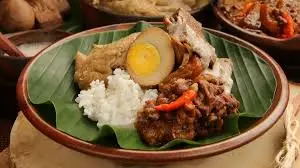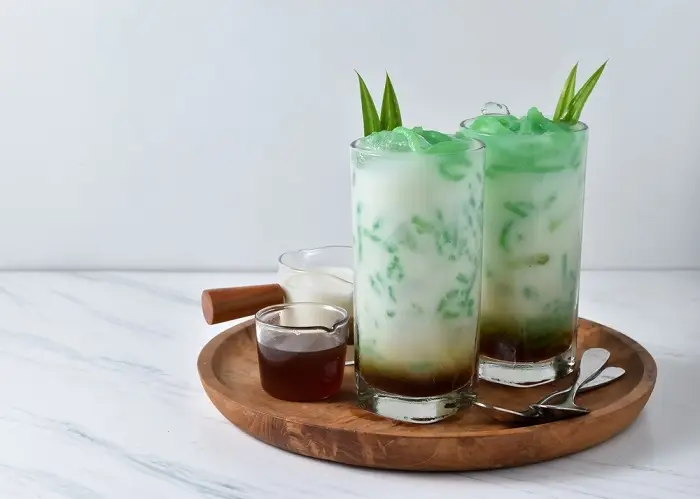jfid – Behind the splendor of Yogyakarta as a city of culture and history lies a culinary richness that is equally captivating.
One of Yogyakarta’s iconic culinary delights is gudeg, a dish made from young jackfruit that has become an inseparable part of the city’s identity.
More than just a dish, gudeg is a cultural heritage steeped in meaning and tradition.
Eating gudeg not only delights the palate but also delves into the philosophy and long history of Yogyakarta.
This article invites you to explore the world of gudeg Jogja, from its unique origins, its dedicated cooking process, to its special taste that makes it so beloved.
Tracing the History of Gudeg
The origin of gudeg is still shrouded in mystery, with various legends and versions circulating.
One popular legend tells of a princess named Putri Pembayun from the Mataram kingdom who was trapped in an old well and had only young jackfruit as her food. The young jackfruit was then turned into a delicious and savory dish, which later became known as gudeg.
Another version suggests that gudeg originated from Javanese tradition during times of famine, where young jackfruit cooked with coconut milk and palm sugar created a hearty and nutritious dish that became a favorite among the people.
Regardless of its exact origins, gudeg has been an integral part of Yogyakarta’s culture since the 16th century. The oldest written evidence of gudeg can be found in the Babad Tanah Jawa, which mentions the dish being served at the wedding of Sultan Agung Hanyokrokusumo in 1625.
Cooking Process of Gudeg: Dedication and Patience
Making gudeg is a process that requires dedication and patience. The young jackfruit, which is initially tough, is boiled for hours with coconut milk and palm sugar until it becomes tender and absorbs the flavors. This cooking process is typically done over a wood fire stove, giving it a distinctive aroma that tantalizes the senses.
Once the jackfruit is tender, other spices such as shallots, garlic, coriander, and cumin are added to enrich the flavor. Bay leaves and galangal are also included to enhance the aroma and deliciousness. The cooking process continues until the gudeg is fully cooked and the flavors have melded perfectly.
Special Taste of Gudeg Jogja
Gudeg Jogja is renowned for its unique and special taste. The combination of sweetness, savory flavors, and a hint of spiciness creates an unforgettable sensation. The tender, slightly fibrous texture of gudeg adds to the enjoyment with every bite.
The uniqueness of gudeg Jogja also lies in its presentation variations. Gudeg is typically served with white rice, krecek (spicy vegetable made from beef skin), boiled eggs, sambal goreng krecek, and other side dishes such as chicken opor, tempeh bacem, and sambal goreng ati.
Exploring Gudeg Heaven in Jogja
For culinary enthusiasts, Yogyakarta is a gudeg paradise. Along the streets, especially in the Wijilan area, you will find rows of gudeg stalls emitting tempting aromas. Each stall has its own recipe and distinctive features, making it no surprise that culinary enthusiasts always want to return to taste gudeg in Jogja.
Some legendary gudeg stalls in Jogja that are a must-try include:
- Gudeg Yu Djum: Famous for its traditional recipe and authentic taste.
- Gudeg Bu Tjitro: Offers a distinctive dry gudeg with a rich sweet flavor.
- Gudeg Pawon: Serves gudeg in a serene and comfortable rural atmosphere.
- Gudeg Mbah Lindu: Known for its flavorful wet gudeg with a soft texture.
More Than Just Food, Gudeg is Culture
Gudeg is not just food but also a representation of Yogyakarta’s culture and traditions. Its presence has deeply rooted itself in the lives of Jogja’s people and has become an important part of various events and celebrations.
Enjoying gudeg with family and friends is a long-standing tradition in Jogja. Gudeg also symbolizes the hospitality and warmth of Jogja’s people, who always welcome tourists with open arms and delicious gudeg.
Efforts to Preserve Gudeg Jogja
As an invaluable cultural heritage, gudeg Jogja continues to be preserved and safeguarded. Various efforts are made to ensure this special dish remains sustainable and can be enjoyed by future generations.
Designation of Gudeg as Intangible Cultural Heritage: In 2021, gudeg was officially designated as an Intangible Cultural Heritage by the Ministry of Education, Culture, Research, and Technology of the Republic of Indonesia. This designation is a testament to the government’s recognition of the cultural value and history of gudeg Jogja.
Gudeg Festival: Every year, Yogyakarta hosts the Gudeg Festival aimed at promoting this dish and attracting tourists. The festival features various gudeg cooking competitions, cultural performances, and culinary exhibitions.
Empowerment of Gudeg Micro, Small, and Medium Enterprises (MSMEs): The government and various organizations continue to empower gudeg MSMEs in Jogja. This is done through training, mentoring, and access to funding to improve the quality of products and competitiveness of gudeg MSMEs.
Challenges and Future of Gudeg Jogja
Despite becoming a global culinary icon for Yogyakarta, gudeg still faces challenges that need to be addressed to ensure its sustainability.
One of the main challenges is maintaining the quality and taste of gudeg amidst modernization and changing lifestyles.
Moreover, efforts are needed to attract the interest of younger generations in learning about and preserving the tradition of making gudeg. This is crucial to ensure that this cultural heritage can continue to be passed down to future generations.
Conclusion
Gudeg Jogja is not just a delicious dish but also an invaluable cultural heritage. Eating gudeg is an unforgettable culinary experience and a part of the journey to explore the cultural richness of Yogyakarta.
With ongoing preservation efforts, it is hoped that gudeg Jogja will continue to thrive and become a globally recognized culinary icon of Indonesia.











